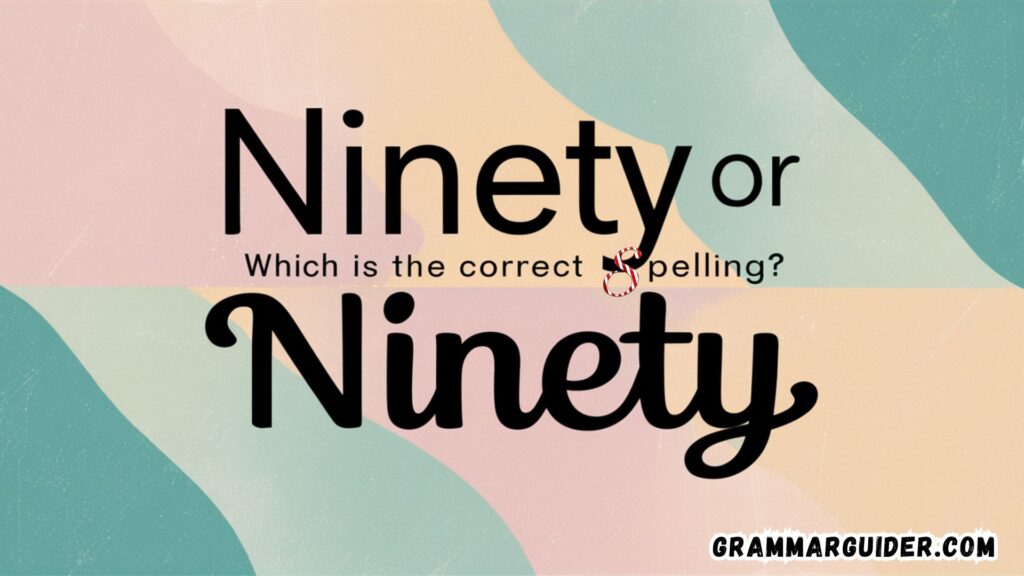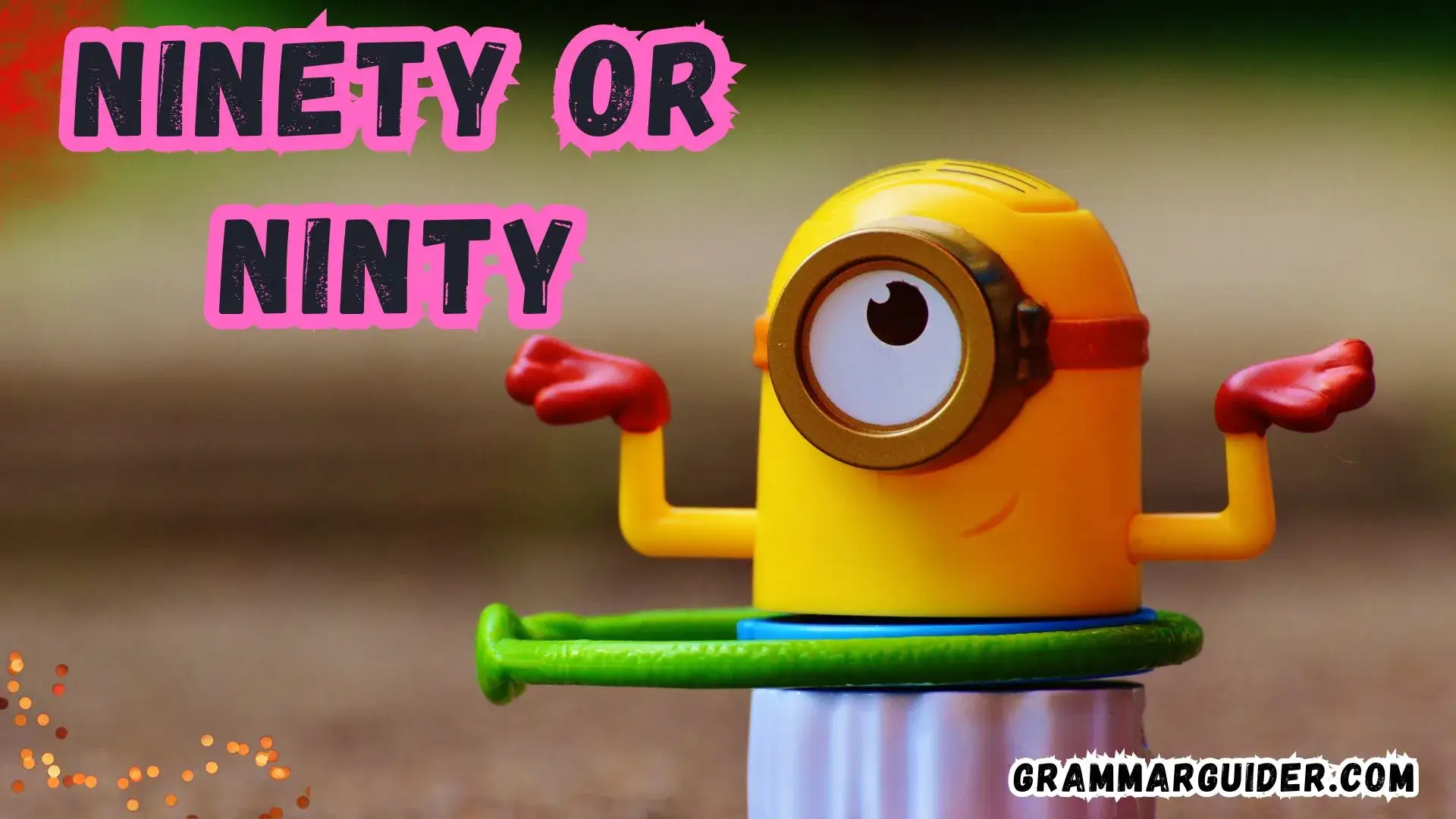When it comes to spelling numbers in English, it’s easy to get tripped up, especially when the difference between correct and incorrect spelling can often be subtle. One of the most common sources of confusion is the spelling of the number ninety. Many people mistakenly spell it ninty, and while it might seem like a harmless mistake, it’s important to understand why ninety is the correct form. This article explores the ninety vs ninty debate, providing clarity, examples, and helpful tips for avoiding number spelling confusion.
Understanding the Correct Spelling of “Ninety”
The number ninety is written with an e after the n, not ninty. This can be surprising to some people, given that many other number spellings, such as twenty or thirty, seem to follow a simpler pattern. But the truth is that ninety is an exception due to its Old English origins.
In Old English, the word for ninety was spelled nigtig. Over time, this evolved into the modern form we use today, ninety, with the additional e reflecting its historical roots. Understanding these spelling rules for numbers can help clarify why ninety is correct, and ninty is not.
Common Misspellings: Why Do People Write “Ninty”?
The misspelling ninty is a result of a common pattern seen in English spelling, where sounds are often simplified or altered. It’s easy to assume that since we have twenty, thirty, and other similar numbers without the extra e, the same might apply to ninety. However, the correct spelling in writing is ninety, and this mistake is something to keep an eye on—especially in professional communication.
Imagine you’re drafting an email to a colleague, and you write the following:
Subject: Weekly Budget Report
Dear John,
I’ve calculated the total expenses for this quarter, and the final figure stands at ninty thousand dollars. Please review and let me know if you have any questions.
Best regards,
Sarah
In this case, Sarah has made the mistake of writing ninty thousand instead of ninety thousand. While it might seem minor, misspelled numbers in a professional setting can make the writer appear less attentive to detail. It’s a good idea to double-check your number spellings before sending emails or reports to ensure language consistency in writing.
How to Remember the Correct Spelling: Mnemonics for Spelling
When you’re dealing with number spelling confusion, it helps to have a trick to remember the correct form. Here’s a useful mnemonic for spelling ninety correctly:
- “Nine + ty”: Think of the word “nine” and then add “ty” at the end. This helps remind you that the correct spelling includes the e after n.
You can apply this technique to other numbers as well, like ninety-one or ninety-five. For example, ninety-one keeps the same rule, as it’s just a variation of the base number ninety.

The Case of “Ninety-one” vs. “Ninty-one”
Another point of confusion is when the number is written with additional components, like ninety-one. Some people might mistakenly write it as ninty-one. However, this is incorrect, and the correct form is ninety-one.
Let’s look at a scenario in an email:
Subject: Project Completion
Hi Tom,
We’re almost at ninety-one percent completion on the new website. We’re expecting to wrap it up by next week.
Cheers,
Jenna
Here, ninety-one is spelled correctly, following the same rule as ninety. It’s important to apply this spelling consistently to maintain professional communication and ensure clarity in your writing.
Exploring Other Number Spelling Confusions
The spelling of numbers can be tricky in many cases. For example, another commonly confused spelling is forty versus fourty. The correct form is forty, not fourty, even though the number “four” seems to follow the same pattern as forty. This follows the same principles as ninety, where historical spelling patterns and phonetics don’t always align.
Let’s explore an email example:
Subject: Invoice for Services Rendered
Dear Linda,
I’ve attached the invoice for the work completed in forty hours. The total due is $4,200. Please confirm when you’ve received this.
Best regards,
Ethan
Here, forty is used correctly, avoiding the common misspelling fourty.
More Common Misspellings: Nineteen, Fourteen, and Others
Another area where number spelling confusion often occurs is with numbers like nineteen and fourteen. Many people mistakenly write ninteen and forteen, adding an extra e where it doesn’t belong. The correct spellings are nineteen and fourteen, respectively.
Here’s an example of nineteen used in a sentence:
Subject: New Member Registration
Hello James,
We’ve just registered nineteen new users this week. It’s great to see the growth! Keep up the great work.
Best regards,
Olivia
In this case, nineteen is correctly spelled, following the same pattern as ninety.
Understanding the Rule: Why English Doesn’t Always Follow Simple Patterns
One of the more interesting aspects of English spelling is that it doesn’t always follow the expected rules. For example, ninety doesn’t have the same spelling pattern as other numbers like twenty or thirty, and the spelling of ninty is not an exception to the rule—it’s simply a mistake. Understanding the Old English origins of ninety and the history behind the way we spell numbers can help clarify why these discrepancies exist.
Writing Tips for Clarity: Avoiding Misspelled Numbers
In your writing, it’s important to pay attention to spelling rules for numbers to avoid confusion. Whether you’re writing an email, a report, or a formal letter, clarity is key. Here are some writing tips for clarity when it comes to spelling numbers:
- Double-check your number spelling: Before sending out any professional document, go over it and check your number spellings carefully.
- Use a spelling checker: Many word processing tools have built-in spelling checkers that can alert you to errors like ninty or fourty.
- Be consistent: If you use ninety in one place, don’t switch to ninty later in your text. Consistency is key in professional communication.
- Be mindful of context: Sometimes, numbers are written out fully (e.g., ninety), while other times they’re abbreviated (e.g., 90). Ensure your usage is appropriate for the situation.
Conclusion: Ninety or Ninty—Which Is Correct?
To recap, ninety is the correct spelling, and ninty is a common misspelling. This confusion arises because of the different ways numbers are spelled in English, and the tendency to simplify or alter certain letters in pronunciation. By remembering some key mnemonics for spelling and following basic spelling rules for numbers, you can avoid common pitfalls in writing.
As we’ve seen, ninety is the correct spelling whether it’s in ninety thousand, ninety-one, or ninety-five. Likewise, spelling like ninty should be avoided. Being aware of these rules can help you write with greater language consistency in writing, whether you’re preparing emails, reports, or other forms of communication.
Table of Common Number Misspellings:
| Misspelled Number | Correct Spelling |
|---|---|
| ninty | ninety |
| fourty | forty |
| ninteen | nineteen |
| forteen | fourteen |
| nintety-one | ninety-one |
| fivety | fifty |
By following these tips and practicing consistent spelling, you can avoid mistakes and communicate clearly and professionally. Whether you’re dealing with ninety or ninty, remember that ninety is always the correct choice in writing.

Harley Rose is a seasoned expert in English grammar and writing tips, blending years of knowledge and a love for language into her work. With a sharp eye for detail and a talent for making grammar accessible, Harley shares practical insights that help readers write with precision and flair. Her content is ideal for anyone looking to strengthen their writing skills and express themselves with confidence.

